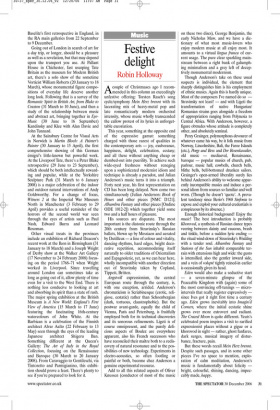Festive delight
Robin Holloway
Acouple of Christmases ago I recommended in this column an exceedingly unfestive offering: Torsten Rasch’s song cycle/symphony Mein Herz brennt with its lacerating mix of heavy-metal pop and late romantic/early modern orchestral intensity, whose music wholly transcended the callow protest of its lyrics in unforgettable excoriation.
This year, something at the opposite end of the expressive gamut: something charged with those rarest of qualities in the contemporary arts — joy, exuberance, happiness, delight, celebration, ecstasy; and all these without anything cheap or dumbed-out into puerility. To achieve such wide-eyed freshness without reneging upon a sophisticated modernist idiom and technique is already a paradox, and Julian Anderson’s music turns it into a triumph. Forty next year, his first representation on CD has been long delayed. Now come two simultaneously (Julian Anderson: Book of Hours and other pieces [NMC D121]; Alhambra Fantasy and other pieces [Ondine ODE 1012-2]) which together yield some two and a half hours of pleasure.
His sources are disparate. The most important is the diatonic route through the 20th century from Stravinsky’s Russian ballets, blown up by Messiaen and aerated by Dutilleux — a line of colour and vitality, dancing rhythms, hard edges, bright decorative repetition, accommodating itself naturally to older traditions of Orientalism and Espagnolerie, yet, as we can hear here, wholly incompatible with another direction out of Stravinsky taken by Copland, Tippett, Britten.
Angstvoll expressionism, the central European route through the century, is, with one exception, arrided. Anderson’s chromaticism is Scriabinesque (erotic, religiose, ecstatic) rather than Schoenbergian (dark, tortuous, claustrophobic). But the postwar avant-garde, equally the child of Vienna, Paris and Petersburg, is fruitfully employed both for its technical discoveries and its sonorous refinements. Ligeti is of course omnipresent, and the purely delicious aspects of Boulez are everywhere apparent, also his French successors who have reconciled their maître both to a rediscovery of natural resonance and to the possibilities of new technology. Experiments in electro-acoustics, so often footling or painful or both, become chez Anderson a genuine experimental resource.
Add to all this related aspects of Oliver Knussen (conductor of most of the music on these two discs), George Benjamin, the early Nicholas Maw, and we have a dictionary of what most music-lovers who enjoy modern music at all enjoy most. It amounts to a virtual lingua franca of current usage. The pure clear sparkling mainstream between a right bank of galumphing minimalism and a grey left of deceptively monumental modernism.
Though Anderson’s take on these usual suspects is individual, the element that sharply distinguishes him is his employment of ethnic musics. Again this is hardly unique. Most of the composers I’ve named do so Stravinsky not least! — and with Ligeti the transformation of native Hungarian/ Romanian strains goes alongside a freedom of appropriation ranging from Polynesia to Central Africa. With Anderson, however, a figure obtrudes whose attitude is completely other, and absolutely seminal.
Percy Grainger, polymorphous devourer of whatever came his way, be it folk music from Norway, Lincolnshire, Bali, the Faroe Islands (etc.), Porgy and Bess and Der Rosenkavalier, old music — mediaeval, Renaissance, baroque — popular musics of church, pub, parlour, music hall, cowbells, church bells, blithe bells, bell-bottomed drunken sailors. Grainger’s open-armed liberality surely lies behind Anderson’s ability to welcome apparently incompatible musics and induce a personal idiom from sources so familiar and well worn. (Though he doesn’t ‘quote’. A prevalent tendency since Berio’s 1968 Sinfonia to expose and exploit your cultural credentials is conspicuous by its absence.) Enough historical background! Enjoy the music! The best introduction is probably Khorovod, a synthesis of Russian dance types veering between dainty and raucous, brash and tinkle, before a sudden lyric ending the ritual wind-down of Stravinsky’s Wedding with a tender soul. Alhambra Fantasy and Stations of the Sun inhabit comparable terrain with extensions high and wide: the gusto is intensified, also the gentler inward side, and a vein of volupté tightly reined-in earlier is occasionally given its head.
Eden would also make a seductive start — a seven-minute glimpse of the Peaceable Kingdom with (again) some of the most convincing off-tunings — microintervals that really register expressively since Ives got it right first time a century ago. Eden grows inevitably into Imagin’d Corners, where the initial ecstatic shine grows ever more extrovert and radiant. The Crazed Moon is quite different. Yeats’s celebrated poem inspires a visit to rarified expressionist places without a gigue or a khorovod in sight — rather, ghost fanfares, dark surges, musical imagery of disturbance, fracture, pain.
But these words recall Mein Herz brennt. Despite such passages, and in some other pieces I’ve no space to mention, exploration of calm meditation, Anderson’s music is fundamentally about felicity bright, colourful, shining, dancing, impeccably made, happy.




































 Previous page
Previous page